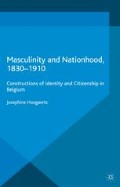Abstract
On 25 August 1830, the beau monde of what would soon become Belgium was attending a performance of Auber’s romantic nationalist opera La Muette de Portici. Common lore of the Belgian ‘operetta rev- olution’ speaks of crowds inspired by the martial tones of the opera running into the streets of Brussels while chanting ‘vive la liberté’ and opening the fight with the army of the Dutch ruler. Negotiations with the Dutch King commenced a mere three days later. The revolution, so it seems, had consisted mainly of an excitable mob smashing factory machinery in their anger over their lack of employment, along with the display of the tricolore of Brabant-Hainaut. In September, however, fits of rebellion became more numerous and violent, and when Dutch prince Frederik entered Brussels with his army, he encountered a pop- ular fury that quickly turned into a national uprising. The skirmishes in the Warande-parc inspired the revolutionaries to form a provisional government but also inspired the creation of a Belgian nation that could be lived, written and sung.1
Access this chapter
Tax calculation will be finalised at checkout
Purchases are for personal use only
Preview
Unable to display preview. Download preview PDF.
Notes
For a discussion of the ‘romantic’ history of the Belgian revolution, see e.g. Peter Rietbergen and Tom Verschaffel, Broedertwist: België en Nederland en de erfenis van 1830, Zwolle: Waanders, 2005 and Jeroen Janssens, De beiden van 1830: alle feiten en mythes, Antwerpen: Meulenhoff, 2005. For an overview of early histories of the Belgian nation, see Jo Tollebeek, ‘Historical Representation and the Nation State in Romantic Belgium’, The Journal of the History of Ideas, 59, 2 (1998), 329–353. On Auber’s opera and its relation to the Belgian revolution, see Sonia Slatin, ‘Opera and Revolution: La Muette de Portici and the Belgian Revolution of 1830 Revisited’, The Journal of Musicological Research, 3 (1979), 45–62 and Maribeth Clark, ‘The Body and the Voice in La Muette de Portici’, 19th Century Music, 27, 2 (2003), 116–131.
See also Bruno Benvindo, ‘La masculinité au XXième siècle en Belgique’, Sextant. Revue du Groupe interdisciplinaire d’études sur les femmes, 19 (2003), 169–176
Thomas Buerman, ‘Maten, makkers, masculiniteit! Historisch onderzoek naar mannelijkheid’, Mededelingenblad. Belgische vereniging voor nieuwste geschiedenis, 29, 1 (2007), 21–26.
André Rauch, Le premier sexe. Mutations et crise de l’identité masculine, Paris: Hachette, 2000.
As also commented upon in Martina Kessel, ‘The Whole Man the Longing for a Masculine World in Nineteenth-Century Germany’, Gender & History, 15, 1 (2003), 1–31.
Judith Surkis, Sexing the Citizen. Morality and Masculinity in France 1870–1920, Ithaca & London: Cornell University Press, 2006, 8.
Margaret Kohn, Radical Space. Building the House of the People, Ithaca & London: Cornell University Press, 2003, 3.
Ute Frevert, Die kasernierte Nation: Militärdienst und Zivilgesellschaft in Deutschland, München: C.H. Beck, 2001.
Odile Roynette, Bons pour le service. L’expérience de la caserne en France à la fin du XIXe siècle, Paris: Belin, 2000.
On the concept ol the soundscape, see Murray Schaler, The Tuning of the World, New York: Random House Inc, 1977.
Alain Corbin, Les cloches de la terre. Paysage sonore et culture sensible dans les campagnes au XIXième siècle, Paris: Albin Michel, 1994
John M. Picker, Victorian Soundscapes, Oxford: Oxford University Press, 2003.
On the ‘period ear’, see Gina Bloom, Voice in Motion. Staging Gender, Shaping Sound in Early Modern England, Philadelphia: University ol Pennsylvania Press, 2007, 111–159.
Patrick Barbier, The World of the Castrati: The History of an Extraordinary Operatic Phenomenon, London: Souvenir Press, 1998.
Ernest Closson, ‘Pourquoi la Brabançonne n’est pas devenue un chant populaire’, Revue Belge, 15, IX (1928), 533–542.
Luc De Vos, Het effectief van de Belgische krijgsmacht en de militiewetgeving, 1830–1914, Brüssel: Koninklijk Legermuseum, 1985.
Author information
Authors and Affiliations
Copyright information
© 2014 Josephine Hoegaerts
About this chapter
Cite this chapter
Hoegaerts, J. (2014). Three Anthems, a Flag and a Tenor: Introduction. In: Masculinity and Nationhood, 1830–1910. Genders and Sexualities in History Series. Palgrave Macmillan, London. https://doi.org/10.1057/9781137392015_1
Download citation
DOI: https://doi.org/10.1057/9781137392015_1
Publisher Name: Palgrave Macmillan, London
Print ISBN: 978-1-349-48317-4
Online ISBN: 978-1-137-39201-5
eBook Packages: Palgrave History CollectionHistory (R0)

